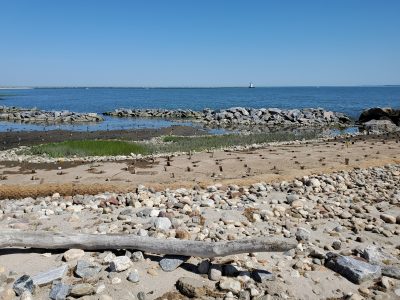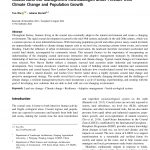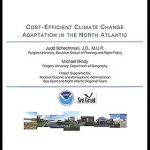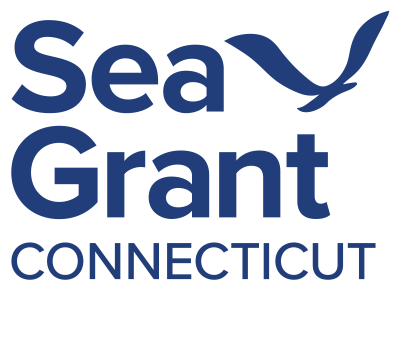
Resilient Communities
The United Nations IPCC in its 4th Assessment Report notes that evidence of changing environmental conditions is unequivocal, based on observations of increased global air and ocean temperatures, widespread melting of snow and ice and globally rising sea levels. In Connecticut, a southern New England state bordered by Long Island Sound, impacts of changing conditions include higher average air and sea temperatures, increased winter precipitation with more rain and less snow, less summer rainfall and a greater frequency of short-term droughts. Projected increases in sea level associated with global temperatures (20 inches by 2050 for the Connecticut coast) will lead to increased coastal inundation, causing greater flooding, erosion, and impacts from storm surges. These changes in the regional climate and sea level will negatively impact both human and natural systems. The 6th IPCC Assessment has been published with updated information and impacts.
Coastal areas will be especially hard hit with flooding and storms potentially degrading wetlands that now provide buffers to human communities, generating both increased property damage and impacts to wildlife. Rising water temperatures in Long Island Sound are already impacting fish populations within Long Island Sound. Warmer air temperatures and heat waves are impacting communities throughout the state, while changes in precipitation patterns are leading to stormwater issues.
The State of Connecticut has been working on issues associated with global change since 2015 when a strategy to reduce greenhouse gas emissions was developed. More information on state efforts can be found at the GC3.
How is Connecticut Sea Grant addressing climate change?
Connecticut Sea Grant is addressing the multi-faceted challenge of worsening impacts through both existing program initiatives and new positions such as the LISS Sustainable and Resilient Communities Extension Professional positions (see story below). Resilience with a focus on adaptation serves as an overarching program focus, informing numerous outreach and education activities. Strategies and tools to assist communities in adapting to impacts are continuously developed and assessed.
Connecticut Sea Grant is focusing on development of numerous resources and tools with regard to natural and nature-based features (NNBF). These features are adaptation solutions that mimic natural systems and conditions and provide ecosystem services while helping to mitigate impacts such as flooding and stormwater runoff.
Connecticut Sea Grant and the UConn Center for Land Use Education and Research (CLEAR) are partnering with researchers, consultants and other professionals to work with municipalities and relevant professionals on adaptation and resilience through the Climate Adaptation Academy (CAA). The program develops workshops, tools and outreach materials on priority impacts to our communities. Tackling topics such as living shorelines and legal issues in the age of climate adaptation, workshops bring in the foremost authorities on issues such that municipal officials, natural resources professionals and others are aware of current developments and solutions. Find past workshop presentations and resources here.

CTSG expands capacity for working on resilience, sustainability
In November 2021, two new positions were created at Connecticut Sea Grant as part of an exciting new initiative funded by the EPA through the Long Island Sound Study (recently renamed the Long Island Sound Partnership) to increase the capacity to serve communities dealing with resilience challenges.
The positions for sustainable and resilient community extension educators were created to focus on issues

such as increased flooding of roads and bridges, wetland loss, erosion and other effects of changing environmental conditions, and to work with four colleagues based at New York Sea Grant under a five-year work plan developed by the two Sea Grant programs.
Deb Abibou focuses on Western Connecticut and is based at the New Haven County Extension Center in North Haven. Sarah Schechter focuses on Eastern Connecticut, based at the UConn Avery Point campus in Groton. Learn more about resources, projects and contact information here.
Article addresses changing environmental conditions and land use management issues
 "Coastal Land Use Management Methodologies under Pressure from Climate Change and Population Growth" an article published in the August 2022 issue of the journal Environmental Management, examines coastal changes in four Connecticut locations: one each in New Haven and Waterford, and two in New London, as examples of different strategies to cope with a changing shoreline and the challenges of changing environmental conditions.
"Coastal Land Use Management Methodologies under Pressure from Climate Change and Population Growth" an article published in the August 2022 issue of the journal Environmental Management, examines coastal changes in four Connecticut locations: one each in New Haven and Waterford, and two in New London, as examples of different strategies to cope with a changing shoreline and the challenges of changing environmental conditions.
Written by Juliana Barrett of Connecticut Sea Grant and the UConn Department of Extension - College of Agriculture, Health and Natural Resources, and Tao Wu of Nanjing Agricultural University in China and the UConn Department of Plant Science and Landscape Architecture, the article finds that a resilient management process must incorporate a cycle of learning, experimenting, and creating with the goal of developing new solutions that are able to deal with our ever-changing environment. The article can be accessed here.
A UConn Today article about the study can be found here.
Legal Issues in the Age of Climate Adaptation: Six Legal Fact Sheets
A number of questions were raised at Legal Issues in the Age of Climate Adaptation, a conference held by UConn CLEAR's and Connecticut Sea Grant's Climate Adaptation Academy in late 2015. The Marine Affairs Institute & RI Sea Grant Legal Program at Roger Williams University School of Law reviewed the questions, which came from the audience during the course of the conference. The Legal Program then developed six fact sheets addressing the following topics:
Flooding, Eminent Domain and Government Authority: FloodingEminentDomain
Responding to Nuisance Flooding of Coastal Highways: Options for Municipalities: CoastalHighwaysFS5.pdf
Takings and Coastal Management: TakingsCoastalManagmentFS1.pdf
Property and Permitting Boundaries on the Shoreline: BeachNourishmentPropertyLinesFS2.pdf
Government Tort Liability Disclosure of Flood Hazard Information:GovernmentLiabilityFS3.pdf
Flood and Erosion Control Structures: FloodErosionControlFS4.pdf
Cost-Efficient Climate Adaptation in the North Atlantic
 This 2013 study was undertaken to raise awareness of the best practices in leading North Atlantic communities. We hope that the results will inspire discussion and action in communities that are now considering how to better protect themselves. This project was sponsored by the National Oceanic and Atmospheric Administration North Atlantic Regional Team and Sea Grant.
This 2013 study was undertaken to raise awareness of the best practices in leading North Atlantic communities. We hope that the results will inspire discussion and action in communities that are now considering how to better protect themselves. This project was sponsored by the National Oceanic and Atmospheric Administration North Atlantic Regional Team and Sea Grant.
"Cost-Efficient Climate Adaptation in the North Atlantic" can be found here.
For More Information
Contact:
Owen Placido, Assistant Extension Educator: Nature-Based Resiliency
Juliana Barrett, Extension Educator Emerita
Publications
View our publications on changing environmental conditions, impacts and resilience
Resilience Resources
U.S. Climate Resilience Toolkit
CTEco Environmental Conditions Online: Connecticut-specific site with maps and visualization tools.
Connecticut Coastal Hazards: A centralized source of information for municipal officials, coastal property owners, state coastal managers, and the general public on coastal hazards in Connecticut.
Connecticut Shoreline Change Analysis
Cost-efficient Climate Adaption in the North Atlantic
Climate.gov This is a NOAA site with the latest information on climate and climate change.
The State of Connecticut's Official Climate Change Website
International Guidelines on Natural and Nature-Based Features for Flood Risk Management (2021)
Save
